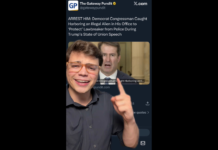Newsom’s War on Memes: A New Frontier in Digital Culture
Get ready, dear readers! The Governor of California, Gavin Newsom, has declared war. Surprisingly, his target is not crime or poverty but memes. Yes, you read that right. In an era where harmless cat videos and entertaining TikTok challenges are the norm, Newsom has taken it upon himself to become the meme sheriff. Let’s delve into this peculiar chapter of his political journey.
The Meme That Started It All
The meme that sparked this controversy sprouted from a viral video that spread across social media like wildfire. For Newsom, however, it wasn’t all fun and games. He labeled it as “defamatory” and “dangerous,” sparking his interest in controlling the untamed frontier of meme culture.
Newsom’s Plan to Regulate Memes
True to his Hollywood roots, Newsom isn’t stopping at expressing public outrage. He plans to legislate joy out of our digital existence. His proposal seeks to outlaw video memes using deepfake technology to produce false or misleading content. In Newsom’s perspective, this step is crucial for “protecting the integrity of public discourse.”
Do We Need New Laws?
But wait—don’t we already have laws against defamation and slander? Why the sudden need for new legislation? Critics argue that existing laws should be sufficient to tackle any malicious intent behind these videos. Furthermore, attempting to regulate memes seems as futile as trying to herd cats—amusing, ineffective, and likely to backfire.
The Internet Reacts
As expected, the internet had a field day with this announcement. Social media platforms were buzzing with reactions ranging from disbelieving laughter to outright defiance. “Who knew 2024 would be the year memes needed a bodyguard?” joked one Twitter user. Another suggested that Newsom might just be bitter about being transformed into a real-life parody.
The Serious Side of the Debate
Jokes and pop culture references aside, there’s a serious discussion brewing. On one hand, deepfakes indeed pose a genuine threat, capable of spreading misinformation faster than one can say “Photoshop.” On the other hand, memes serve as a medium of expression, often used to critique and satirize public figures—an essential part of free speech.
The Future of Meme Culture
So, will Newsom’s crusade against video memes gain traction, or will it fail spectacularly? It’s too early to tell, but one thing is clear: this conflict over digital culture is just starting to heat up. As lawmakers across the nation watch California’s next move, meme creators worldwide are sharpening their digital tools, ready to create the next viral sensation.
Will the law eventually draw a line in the digital sand, or will memes triumph in this clash of the titans? Only time will reveal. Until then, keep your GIFs at the ready and your memes loaded—because in the realm of politics, reality is often stranger (and funnier) than fiction.
Final Thoughts
As we await the outcome of this bizarre war on memes, let’s remember that our freedom to express ourselves should not be stifled by political correctness or attempts to control our digital lives. We must stand firm against such absurd proposals and continue to use our voices—and our memes—to hold public figures accountable. After all, in the great American tradition of free speech, sometimes laughter is the best form of resistance.
We encourage you to share your thoughts on this topic in the comment section below. How do you feel about this proposed legislation? Do you think it’s necessary or overreaching? Let’s continue this conversation!
Source: Steadfast and Loyal




democrats hate America and are destroying America for china and iran